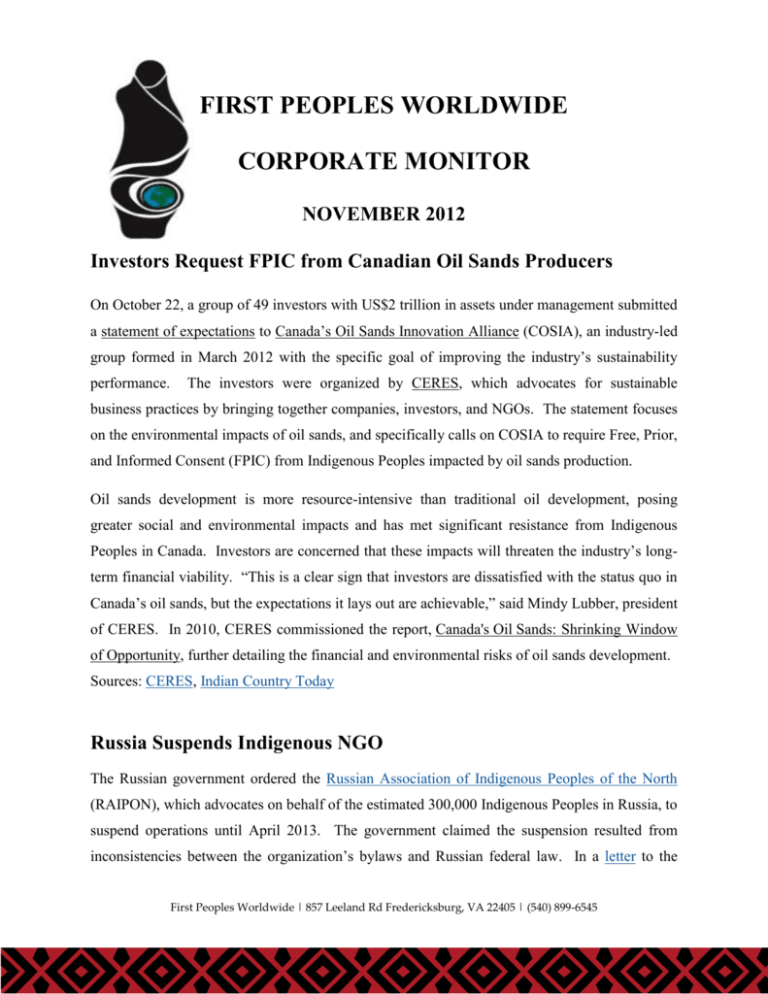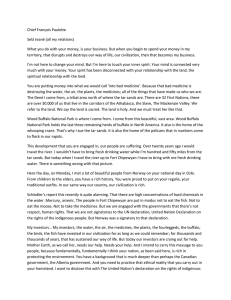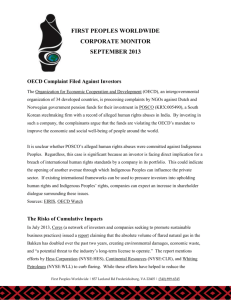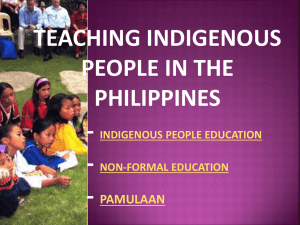November 2012 - First Peoples Worldwide
advertisement

FIRST PEOPLES WORLDWIDE CORPORATE MONITOR NOVEMBER 2012 Investors Request FPIC from Canadian Oil Sands Producers On October 22, a group of 49 investors with US$2 trillion in assets under management submitted a statement of expectations to Canada’s Oil Sands Innovation Alliance (COSIA), an industry-led group formed in March 2012 with the specific goal of improving the industry’s sustainability performance. The investors were organized by CERES, which advocates for sustainable business practices by bringing together companies, investors, and NGOs. The statement focuses on the environmental impacts of oil sands, and specifically calls on COSIA to require Free, Prior, and Informed Consent (FPIC) from Indigenous Peoples impacted by oil sands production. Oil sands development is more resource-intensive than traditional oil development, posing greater social and environmental impacts and has met significant resistance from Indigenous Peoples in Canada. Investors are concerned that these impacts will threaten the industry’s longterm financial viability. “This is a clear sign that investors are dissatisfied with the status quo in Canada’s oil sands, but the expectations it lays out are achievable,” said Mindy Lubber, president of CERES. In 2010, CERES commissioned the report, Canada's Oil Sands: Shrinking Window of Opportunity, further detailing the financial and environmental risks of oil sands development. Sources: CERES, Indian Country Today Russia Suspends Indigenous NGO The Russian government ordered the Russian Association of Indigenous Peoples of the North (RAIPON), which advocates on behalf of the estimated 300,000 Indigenous Peoples in Russia, to suspend operations until April 2013. The government claimed the suspension resulted from inconsistencies between the organization’s bylaws and Russian federal law. In a letter to the First Peoples Worldwide | 857 Leeland Rd Fredericksburg, VA 22405 | (540) 899-6545 Arctic Council, RAIPON leaders argued that the organization legally operated under their bylaws for 22 years, and that the decision was motivated by RAIPON’s criticism of Russian energy policies. Many Indigenous Peoples represented by RAIPON live in remote regions of Siberia and have meager representation in government. When companies base their Indigenous Peoples practices off government policies that violate Indigenous Peoples’ rights, they become exposed to the risks associated with these policies. Using NGOs as intermediaries for interacting with Indigenous Peoples also poses risks, as NGOs can be subject to closure from governments. RAIPON’s suspension highlights the importance of establishing relationships with Indigenous communities directly. Sources: Arctic Council Indigenous Peoples Secretariat, Bellona Foundation Opportunities from Misguided Government Policies The Brazilian Congress is currently debating Directive 303 which, if legalized, would halt the process of expanding Indigenous lands and allow certain development projects to be carried out on Indigenous territory without community consultation. To protest the directive, Guajajara and Awa villagers blockaded a main railway of Brazilian mining firm Vale (NYSE:VALE), and suspended cargo transport along the line. Vale issued an injunction to lift the blockade, and announced an end to the protests on October 5. However, the company also provided the communities with buses to take to the nation’s capital to voice their opposition to those directly responsible for the proposal. When government policies are detrimental to Indigenous Peoples’ concerns, companies are provided with the opportunity to address these concerns in a more direct manner. Sources: Vale, Survival International Ecuador Ruling Gains International Recognition On November 9, an Argentine court froze all of Chevron Corporation’s (NYSE:CVX) assets in the country (estimated at US$2 billion). The decision indicates growing international recognition of a 2011 ruling by an Ecuadorian court ordering Chevron to pay US$19.04 billion in reparations for environmental damages to Indigenous communities in the Ecuadorian Amazon. First Peoples Worldwide | 857 Leeland Rd Fredericksburg, VA 22405 | (540) 899-6545 In order to recoup the full amount owed by the company, the communities filed actions in Argentina, Brazil and China, seeking recognition of the court’s verdict and the freezing of Chevron’s assets in those countries. Argentina is the first country outside Ecuador to do so. Because the freeze applies to the full US$19.04 billion of the Ecuador judgment, any further investment in Argentina by Chevron risks seizure as well. The decision is based on the Inter-American Convention on the Execution of Preventative Measures, a treaty ratified by most South American countries. The treaty states a defendant's assets will automatically be frozen if it fails to pay a final judgment by a foreign court. Sources: New York Times, Upstream Online, Amazon Defense Coalition Investment Cautioned in Asia Pulp and Paper Over sixty Indonesian and international civil society organizations signed a letter to financial institutions, cautioning investment in companies associated with the Indonesian conglomerate Sinar Mas Group, specifically its subsidiary Asia Pulp and Paper (APP), because of the company's clear-cutting practices and disregard for Indigenous Peoples' FPIC rights in Indonesia. According to the letter, Indonesia's Ministry of the Environment is investigating three APP wood suppliers as possible targets for environmental lawsuits. An additional four suppliers were implicated in courts for bribery of public officials. The letter mentions APP's loss of several high-profile customers in recent years – including Disney, Hasbro, Mattel, Unilever, Nestle, Danone, Xerox, and Mondi – due to the increased reputational risk associated with using them as a supplier. Sources: European Environmental Paper Network Biofuels Sets Best Practices In June 2012, Raizen Fuels, a division of Cosan Limited (NYSE:CZZ) and Royal Dutch Shell (LSE:RDSA), stopped sourcing sugarcane from Guarani lands, setting a good example for companies to follow. Although the Guarani Indigenous Peoples have entered agreements with First Peoples Worldwide | 857 Leeland Rd Fredericksburg, VA 22405 | (540) 899-6545 the Brazilian government to map their lands, the process remains at a standstill, leaving companies with a vague legal framework when operating on Guarani territory. Currently, the Guarani are campaigning for Bunge Limited (NYSE:BG) to stop sourcing sugarcane from farmers that overtook their land without obtaining FPIC. The Guarani claim that the farmers used violence and threats to force them off their lands, and that pesticides and improperly discarded machinery and crop residue is poisoning their water supply. Bunge told Survival International that it will continue to source sugarcane from the land until it is officially demarcated by Brazilian authorities as belonging to Indigenous Peoples. Sources: Survival International, BBC First African Land Forum in Cameroon Foreign land investment in developing nations is heavily concentrated in Africa. According to a 2011 report by the International Land Coalition, 948 publicly reported land acquisitions totaling 134 million hectares have taken place in Africa (compared to 43 million hectares in Asia and 19 million hectares in Latin America). African governments frequently lease land belonging to Indigenous Peoples without giving them a say in the matter and residents are often forcibly removed from their homes with little or no compensation. The leases contribute little to public expenditures; because African land markets are ill-developed and governments weak, rents are as low as $2 per hectare per year. On November 7, land rights experts from 22 countries attended the first African Land Forum in Cameroon, for the purpose of discussing and promoting land policies that are responsive to the needs of Indigenous Peoples and other marginalized communities in Africa. The participants unanimously approved the Yaoundé Declaration, which contained recommendations to African governments and multinational corporations on land policy reform. The recommendations included protection and recognition of Indigenous Peoples’ land claims (including communal lands), distribution of benefits of land development to affected communities, and the obtainment of FPIC from Indigenous Peoples in large-scale land investment decisions. Investors interested in African land must consult the Yaoundé Declaration First Peoples Worldwide | 857 Leeland Rd Fredericksburg, VA 22405 | (540) 899-6545 and other independent guidelines, to ensure their activities do not infringe on Indigenous Peoples’ rights. Sources: The Economist, International Land Coalition Damaging Reputation The Murum Dam in the Malaysian state of Sarawak, initially advertised by the government as a model of best practice for socially responsible development, has been halted since September 26, by Indigenous Peoples blocking access roads to the dam's construction site. The blockade was in response to government plans to resettle 1,500 Penan and Kenyah villagers to make way for the flooding of the dam's reservoir. The Murum Dam is the first of twelve dams being constructed by the Malaysian government as part of the Sarawak Corridor of Renewable Energy Initiative. Government officials have declared that the dam adheres to an expansive list of international standards, including UNDRIP, the Equator Principles, and the Sustainability Guidelines of the International Hydropower Association (IHA). The resettlement of Indigenous Peoples without consultation or consent would violate these standards. The reputational damage caused by the protests could have major implications for the future of international development in Malaysia. The IHA's May 2013 global conference, attended by investors and industry executives from around the world, is scheduled to take place in Kuching, the capital city of Sarawak. The IHA intended to feature the dam to exemplify the success of its Sustainability Guidelines, and the protests may prevent them from doing so. The dam is also the first international project of China's state-owned Three Gorges Corporation (which created controversy by relocating over 1.2 million Chinese for the Three Gorges Dam in 2012), whose economic support is crucial for the remaining eleven dams. Sources: International Rivers, The Guardian First Peoples Worldwide | 857 Leeland Rd Fredericksburg, VA 22405 | (540) 899-6545









